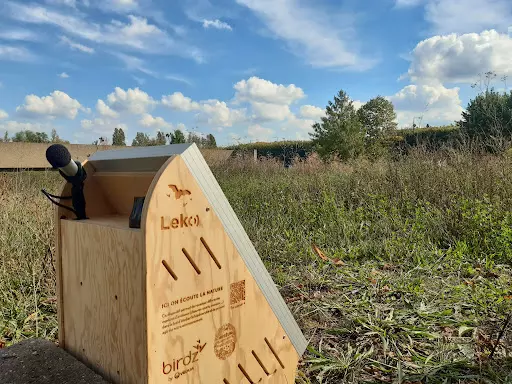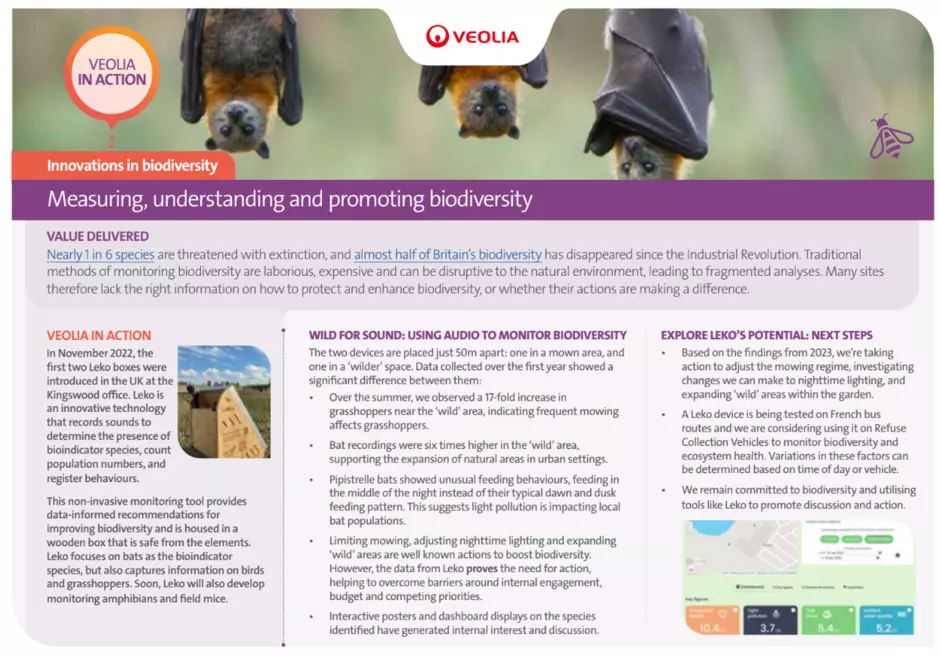Nearly 1 in 6 species are threatened with extinction, and almost half of Britain’s biodiversity has disappeared since the Industrial Revolution. Traditional methods of monitoring biodiversity are laborious, expensive and can be disruptive to the natural environment, leading to fragmented analyses. Many sites therefore lack the right information on how to protect and enhance biodiversity, or whether their actions are making a difference. Veolia has been exploring ways to improve biodiversity by adopting digital technology to assess habitats and species in a different way, using the data to inform our management plans for sites.
VEOLIA IN ACTION
In November 2022, the first two Leko boxes were introduced in the UK at the Kingswood office. Leko is an innovative technology that records sounds to determine the presence of bioindicator species, count population numbers, and register behaviours.
This non-invasive monitoring tool provides data-informed recommendations for improving biodiversity and is housed in a wooden box that is safe from the elements. Leko focuses on bats as the bioindicator species, but also captures information on birds and grasshoppers. Soon, Leko will also develop monitoring amphibians and field mice.

WILD FOR SOUND: USING AUDIO TO MONITOR BIODIVERSITY
The two devices are placed just 50m apart: one in a mown area, and one in a ‘wilder’ space. Data collected over the first year showed a significant difference between them:
• Over the summer, we observed a 17-fold increase in grasshoppers near the ‘wild’ area, indicating frequent mowing affects grasshoppers.
• Bat recordings were six times higher in the ‘wild’ area, supporting the expansion of natural areas in urban settings.
• Pipistrelle bats showed unusual feeding behaviours, feeding in the middle of the night instead of their typical dawn and dusk feeding pattern. This suggests light pollution is impacting local bat populations.
• Limiting mowing, adjusting nighttime lighting and expanding ‘wild’ areas are well-known actions to boost biodiversity. However, the data from Leko proves the need for action, helping to overcome barriers around internal engagement, budget and competing priorities.
• Interactive posters and dashboard displays on the species identified have generated internal interest and discussion.
Taking Action to Protect and Enhance
Based on the findings from 2023, we’re taking action to adjust the mowing regime, investigating changes we can make to nighttime lighting, and expanding ‘wild’ areas within the garden.
Monitoring Biodiversity and Ecosystems
A Leko device is being tested on French bus routes and we are considering using it on Refuse Collection Vehicles to monitor biodiversity and ecosystem health. Variations in these factors can be determined based on time of day or vehicle.
Taking Action and Engaging with Leko and Other Tools
We remain committed to biodiversity and utilising tools like Leko to promote discussion and action.
HOW CAN WE HELP YOU?
Our Experts are Here to Support Your Business: Discover How We Can Help



